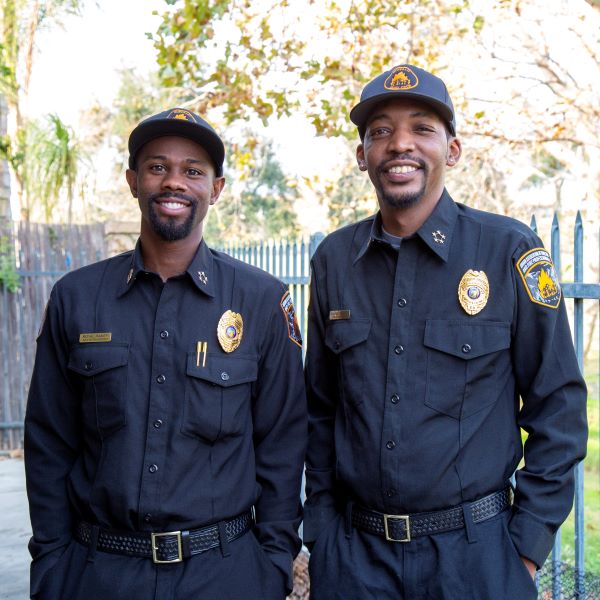Preventing wildfires by training formerly incarcerated individuals for firefighting careers
Overview
After being released from prison, Brandon Smith and Royal Ramey struggled to find firefighting jobs despite receiving the required training and experience while incarcerated at one of California’s fire camps. Fires were ravaging the state and firefighting agencies were reporting labor shortages — so, why weren’t they being hired? Like countless other fire camp alumni, Smith and Ramey had to overcome significant barriers to entering the profession such as the stigma of having a prior criminal record and limited access to transportation. Determined to succeed, the leaders enrolled in a fire academy to be trained again and, nearly two years post-release, were hired as professional wildland firefighters. While on their first assignment, they ran into friends still in fire camps who were eager to learn how the leaders were able to find success after returning home from prison. That encounter inspired Smith and Ramey to create The Forestry and Fire Recruitment Program (FFRP) to help their peers navigate the complicated hiring process to become firefighters.
FFRP meets at a unique intersection of environmental and criminal justice challenges in California.
— Brandon Smith
Launched informally in 2015 and incorporated in 2018, FFRP recruits incarcerated firefighters from fire camps and provides individuals — primarily formerly incarcerated men and women of color — with on-the-job training, re-entry support, and connections to firefighting careers. To date, Smith and Ramey have trained and provided career support to more than 3,000 currently and formerly incarcerated individuals.
Our work prevents wildfires, diversifies the workforce, and creates positive opportunities for formerly incarcerated individuals to contribute to their communities.
— Royal Ramey
Primary Regions Served
Update
In 2024 Brandon Smith stepped down as CEO and now serves as Senior Advisor to FFRP.
Challenge
- California’s fire season is becoming longer and more destructive. The California Department of Forestry and Fire Protection (Cal Fire) spent $3.4 billion on fire prevention and protection and resource management in the 2020-21 fiscal year, a 325 percent increase since 2005-06.[1]
- As fire season grows, so does the demand for firefighters. At the same time, the agencies responsible for wildfire prevention and suppression report sizeable labor shortages. [2]
- In recent years, the number of available incarcerated firefighters — who comprise most of the state’s “hand crews” — has declined due to criminal justice reforms and the expedited release of those serving a sentence for non-violent offenses during the coronavirus pandemic.[3]
- Despite having the required training and experience to become career firefighters, fire camp alumni often face barriers to entering the profession. Barriers include stigma, parole restrictions, transportation barriers, lack of childcare, financial instability, and a criminal record hindering their ability to obtain the emergency medical technician (EMT) license required for the job.[4]
Innovation
- Through its “Worker Hub,” FFRP helps formerly incarcerated individuals apply for firefighting positions, maintain a good physical condition through weekly training sessions, and prepare for interviews. Additionally, FFRP and its partners help participants address barriers to employment by providing case management and re-entry support services.
- While participants await job opportunities with fire agencies, FFRP provides transitional employment and on-the-job training through its four hand crews based in Los Angeles, San Bernardino, and Ventura Counties. Participants receive an hourly wage of $15 while conducting fire prevention, hazard mitigation and post-fire clean-up work subsidized by private homeowners, businesses, local fire safe councils, and federal land managers.
- In 2019, FFRP launched a five-month wildland fire academy, Career Training Program (CTP), to provide participants with the required training for professional careers in the wildland and forestry sector. Participants receive monthly stipends, 300 hours of classroom-based and on-the-job training, and 300 hours of whole person care.
- In 2021, FFRP launched its own private firefighting crew — The Buffalo Fire Crew — which is comprised of five full-time and 10 part-time firefighters, many of whom are CTP graduates.
Impact
- Since 2015, Smith and Ramey have helped an estimated 3,000 currently and formerly incarcerated individuals prepare and apply for firefighting careers.
- To date, FFRP has trained 110 formerly incarcerated individuals who have secured jobs with the Cal Fire, the US Forest Services, and private fire departments.
- FFRP has also graduated a total of 41 CTP participants. Of the 2021 graduates, one individual is attending EMT school, and 31 were hired as firefighters. Only one of the CTP participants has returned to prison.
- In addition to work on active fires or prescribed burns, FFRP’s fire crews helped roughly 400 homeowners in San Bernardino and Los Angeles Counties in 2021 by removing vegetation around their homes to lessen the threat of wildfire.
- FFRP is addressing larger equity issues in firefighting by developing a workforce pipeline of trained, qualified people of color and women — communities historically excluded from the firefighting workforce. According to the Census Bureau, more than 95 percent of firefighters are male, and nearly 80 percent are non-Hispanic white.[5] FFRP estimates that 90 percent of its participants are formerly incarcerated people of color, and 15 percent are women.
Opportunity
- In 2022, FFRP plans to expand to Northern California in partnership with Berkeley Forests, a program of University of California at Berkeley. FFRP plans to recruit, train, and provide on-the-job training to approximately 200 formerly incarcerated individuals. Those individuals will assist Berkeley Forest staff with the development and testing of appropriate climate change-informed management strategies for forested watersheds in five research forests across the state.
- FFRP’s three-year plan includes expanding its programming to additional California communities and increasing the number of formerly incarcerated individuals who are trained and connected to professional careers in the wildland and forestry sector, such as firefighters, forestry technicians, defensible space inspectors, heavy equipment operators, and chainsaw operators.
The written profile and video reflect the work of the leader(s) the year they received a Leadership Award. Please contact the leader(s) for current information.
